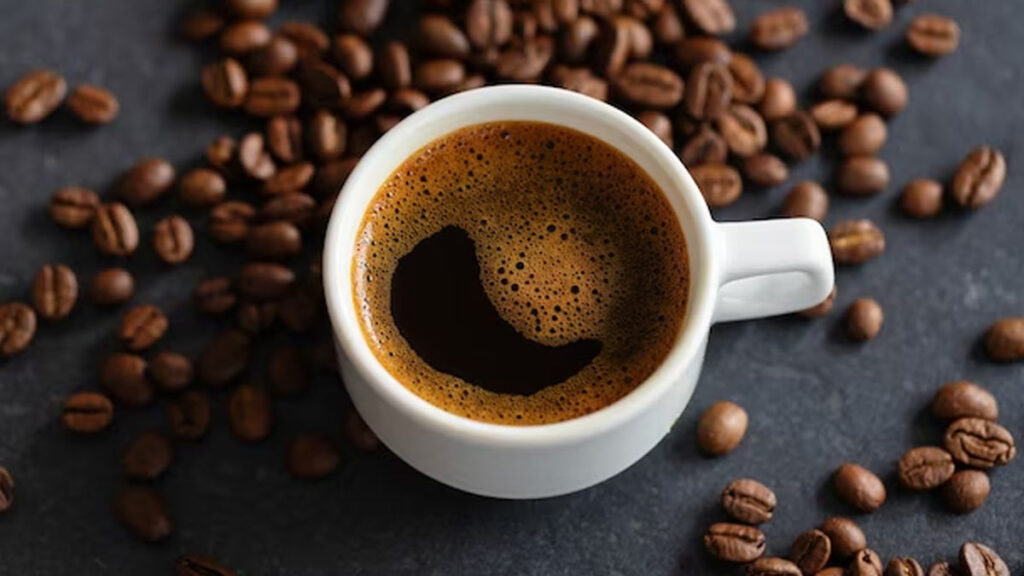कॉफी दुनिया भर में सबसे लोकप्रिय पेय पदार्थों में से एक है, जिसमें प्रतिदिन 2.25 बिलियन कप से अधिक खपत होती है। लोग इसे न केवल इसके स्वाद के लिए पीते हैं, बल्कि इसकी कैफीन सामग्री के कारण प्रदान की जाने वाली ऊर्जा को बढ़ावा देने के लिए भी पीते हैं। शोध बताते हैं कि कॉफी कई स्वास्थ्य लाभ प्रदान कर सकती है, लेकिन कई चीजों की तरह, संयम महत्वपूर्ण है। यह लेख कॉफी के उपयोग, स्वास्थ्य लाभ और संभावित जोखिमों की पड़ताल करता है।

कॉफी के उपयोग
कॉफी का सेवन विभिन्न कारणों से किया जाता है:
- Energy Boost: Due to its caffeine content, coffee helps improve focus and reduce fatigue.
- Social Drink: Coffee is often enjoyed as part of a daily routine or social gatherings.
- Antioxidant Source: Coffee contains antioxidants, which can protect cells from damage.
कॉफी के स्वास्थ्य लाभ
शोधकर्ताओं ने पाया है कि कॉफी पीने से कई संभावित स्वास्थ्य लाभ मिल सकते हैं:

- Protection Against Type 2 Diabetes: Studies show that people who drink coffee regularly have a lower risk of developing type 2 diabetes. Increasing your daily intake by just one cup can reduce this risk by 11%. Both caffeinated and decaffeinated coffee are linked to a lower risk of metabolic syndrome, which includes conditions like diabetes.
- Reduced Risk of Parkinson’s Disease: Caffeine in coffee may help protect against Parkinson’s disease. Research suggests that men who drink more than four cups a day may lower their risk by fivefold. Coffee consumption may also reduce the chances of depression and Alzheimer’s disease.
- Liver Health: Coffee is associated with a reduced risk of liver diseases like cirrhosis, liver cancer, and nonalcoholic fatty liver disease (NAFLD). Drinking two to three cups a day may lower the risk of liver cancer by 38% and chronic liver disease by 46%.
- Heart Health: Moderate coffee consumption—three to five cups a day—can reduce the risk of heart disease by 15%. It has also been shown to lower overall mortality rates. However, excessive consumption may raise cholesterol levels in some individuals, which could increase heart-related risks.
- Weight Management: Some studies suggest that coffee may aid in weight loss. Higher coffee intake has been linked to a reduction in body weight, fat mass, and body mass index (BMI). However, coffee alone is not a substitute for a healthy diet and exercise.
कॉफी का पोषण मूल्य

एक कप ब्लैक कॉफी में केवल 2 कैलोरी होती है और यह राइबोफ्लेविन (विटामिन बी 2), नियासिन (विटामिन बी 3), मैग्नीशियम और पोटेशियम जैसे पोषक तत्व प्रदान करता है। कॉफी बीन्स में पॉलीफेनॉल, एंटीऑक्सिडेंट भी होते हैं जो मुक्त कणों से बचाते हैं, जो मोटापे और मधुमेह से जुड़े कोशिका क्षति और सूजन का कारण बन सकते हैं।
कॉफी के जोखिम और दुष्प्रभाव
जबकि कॉफी कई लाभ प्रदान करती है, बहुत अधिक या कुछ शर्तों के तहत सेवन करने से नकारात्मक प्रभाव हो सकते हैं:
- Bone Health: High coffee intake may increase the risk of bone fractures, especially in women. Men, however, might experience a slight reduction in fracture risk.
- Pregnancy Complications: Drinking large amounts of coffee during pregnancy may increase the risk of miscarriage, low birth weight, and preterm birth. Pregnant women are advised to limit their caffeine intake.
- Gastroesophageal Reflux Disease (GERD): Excessive coffee consumption can irritate the stomach and worsen symptoms of GERD, a condition where stomach acid flows back into the esophagus.
- Mental Health: High caffeine intake may increase anxiety, particularly in individuals with panic or social anxiety disorders. It may also trigger mania or psychosis in susceptible individuals. Excessive caffeine during adolescence has been linked to long-term changes in the brain, potentially leading to anxiety-related conditions in adulthood.
- Toxic Substances: Coffee can contain harmful substances such as mycotoxins, a type of mold that can contaminate coffee beans. Acrylamide, another chemical found in coffee, has raised some concerns, though more research is needed.
- Other Side Effects:
- Insomnia: Too much caffeine, especially later in the day, can disrupt sleep patterns.
- High Blood Pressure: Drinking coffee during exercise may increase the risk of heart problems in some individuals.
- Fertility: High caffeine intake may affect fertility, and excessive consumption during pregnancy can harm the fetus.
कॉफी बनाम चाय: अंतर क्या है?

कॉफी और चाय दोनों में कैफीन होता है, हालांकि कॉफी में आमतौर पर उच्च स्तर होता है। जबकि कॉफी में हृदय रोग और यकृत रोग जैसी स्थितियों के खिलाफ मजबूत सुरक्षात्मक प्रभाव पड़ता है, चाय भी कई स्वास्थ्य लाभों से जुड़ी होती है, खासकर पुरुषों में। कॉफी और चाय के बीच का चुनाव व्यक्तिगत प्राथमिकताओं पर निर्भर हो सकता है, क्योंकि खपत की गई मात्रा के आधार पर दोनों के लाभ हैं।
समाप्ति
कॉफी, जब मॉडरेशन में खपत होती है, तो टाइप 2 मधुमेह, पार्किंसंस रोग और यकृत रोग के जोखिम को कम करने सहित कई स्वास्थ्य लाभ प्रदान कर सकती है। यह हृदय स्वास्थ्य का समर्थन कर सकता है और वजन प्रबंधन में सहायता कर सकता है। हालांकि, बहुत अधिक कॉफी पीना या चीनी और क्रीम जैसे अस्वास्थ्यकर तत्व जोड़ना इसके लाभों को कम कर सकता है और नए स्वास्थ्य जोखिमों को पेश कर सकता है। गर्भवती महिलाओं, चिंता वाले व्यक्तियों, और हड्डी के फ्रैक्चर के जोखिम वाले लोग संभावित दुष्प्रभावों से बचने के लिए अपने कॉफी सेवन को सीमित करना चाह सकते हैं।

अंततः, कई खाद्य पदार्थों और पेय पदार्थों की तरह, कुंजी संतुलन है। एक दिन में तीन से चार कप कॉफी का सेवन आम तौर पर ज्यादातर लोगों के लिए सुरक्षित होता है और इससे समग्र स्वास्थ्य में भी सुधार हो सकता है।


